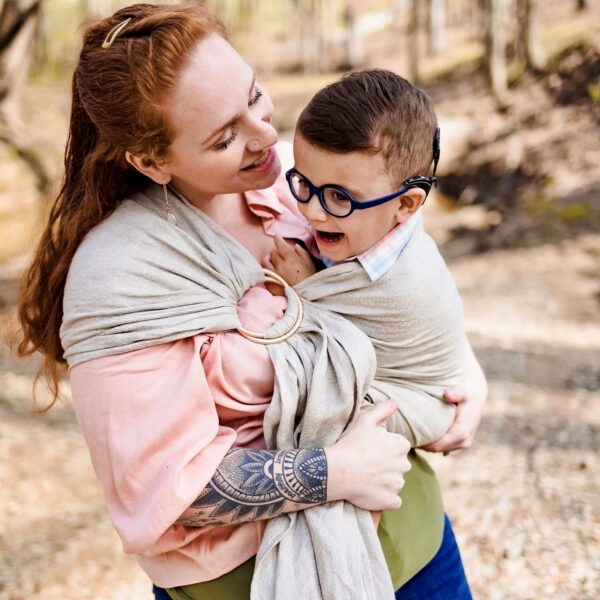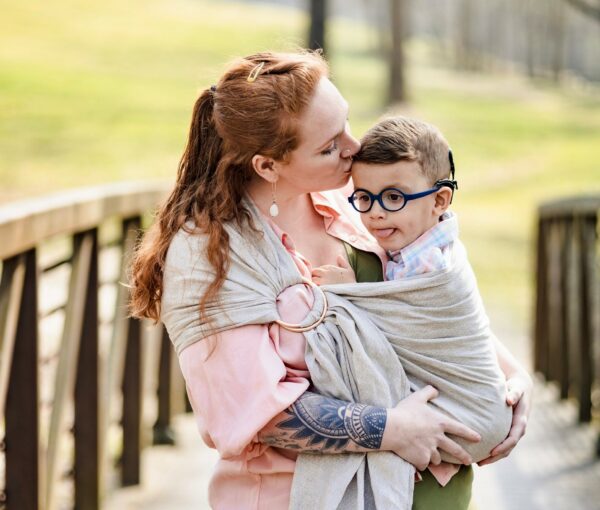Liam was diagnosed with bilateral sensorineural hearing loss as a result of Usher syndrome. His parents were referred to a hearing health specialist, where it was identified that he was a candidate for cochlear implants. After receiving cochlear implants, Liam now loves to speak, listen to music and sing. Read his story here:
“Our youngest son, Liam, failed his newborn hearing screening two separate times while we were still in the post-partum unit at the hospital, after his birth. The hospital had us come back about a week later, where he failed the test a third consecutive time. A follow up with his pediatrician led us to a referral to the audiology department at a nearby hearing health facility in Atlanta for an automated brainstem response test or ABR.
 Finding helpful resources for the path forward
Finding helpful resources for the path forward
During that appointment when Liam was just shy of one month old, he was diagnosed with bilateral sensorineural hearing loss. He was fitted for hearing aids one month later but received no benefit from them. He was then referred for bilateral cochlear implantation. My husband and I then had to decide which one of three cochlear implant companies we were going to choose for our son. After seeing an example of the exterior components – the sound processors – for each company, we were automatically drawn to Cochlear because it seemed to be the smallest and most visually appealing to our eyes. We then set up a consultation with a Cochlear Representative at a local coffee shop to discuss the products more in depth.
My husband’s first language is Spanish, so the fact that Cochlear had a Spanish speaking consultant was a big plus for us. She was very personable and has a daughter who is a Cochlear™ Baha® System recipient. The fact that she was able to tell us about her positive experiences with Cochlear from a parental standpoint was what made us choose Cochlear.
Finding out about our son’s hearing impairment was the hardest thing that myself and my husband have ever had to go through. But, learning that there was an option to gift him the ability to hear gave us hope. Of course, we were scared to put our baby through surgery at such a young age1, but looking back, it is the best decision we ever made for our family.
A cochlear implant helped Liam in more ways than we imagined
Our decision was especially important because he was diagnosed with Usher syndrome about a year after he was implanted. This syndrome not only took away his natural ability to hear, but it will slowly rob him of his ability to see due to a degenerative eye condition called Retinitis pigmentosa. Given these diagnoses, had we not decided to have him receive cochlear implants, he would have eventually been unable to listen, speak, nor see. At least now we know that we decided to give him sound, so that when his vision does deteriorate later in life, he’ll have his sense of sound to rely on.
Our son is almost 5 years old, and he LOVES to listen and speak. He has been through a lot of speech therapy and is a part of a special classroom for hearing impaired toddlers. Through all these accommodations and therapies, he has been able to meet so many amazing people and friends along his journey, while making amazing progress with his ability to catch up to his peers. His progress has been so great that he will be starting kindergarten in a mainstream classroom next school year.
When speaking with him, you can’t even tell that he went through his first 10 months of life without any sound. He loves to listen to music, and he is quite a singer as well. He loves to swim, so the Aqua+ waterproof accessory2 has been an absolute lifesaver for our family. Since he also wears glasses, the Hugfit™ accessory has also made it possible to attach his processors to his glasses without having to worry about them falling off.
 Liam’s life from here on out
Liam’s life from here on out
Like many toddlers nowadays, Liam enjoys watching videos on his tablet. Sometimes, the people around him don’t want to listen to it when he does; but the Bluetooth3 streaming abilities of Liam’s sound processors has been amazing for that. He thinks it is so cool that he has ‘built in headphones’ inside of his sound processors as he likes to tell everyone. The first things that Liam asks for when he wakes up every morning are his sound processors and his glasses, and they don’t come off until it is time for bed OR if he is ready for a nap (he has no problem taking them off and telling us that he is ready to go to sleep).
We have two other children that are not hearing impaired, and if you could not visually see his processors, you would NEVER know that he is deaf, but hearing through manmade devices. It is amazing to see how these devices have allowed Liam and our family to almost forget that he was born deaf.
Our goal for Liam is to raise him to be as independent as he possibly can be and receiving cochlear implants was a huge step in that direction. Given his Usher syndrome, Liam will face many obstacles as his life progresses, but I am hopeful that we are raising him up to be able to withstand any and everything that will try to knock him down. I am more than grateful for what Cochlear has provided for Liam and our family and look forward to any upgrades and features that I know are to come in the future.”
If your child is experiencing hearing loss, cochlear implants and speech therapy may help them in their development. Learn about these solutionstoday!
- In the US, the cochlear implant system is intended for use in children 9 to 24 months of age who have bilateral profound sensorineural deafness and demonstrate limited benefit from appropriate binaural hearing aids. Children two years of age or older may demonstrate severe to profound hearing loss bilaterally. In Canada, the Cochlear Nucleus Implant System (CI500 and CI600 Series) is approved for use in children 9 to 24 months of age who have profound sensorineural hearing loss in both ears and demonstrate limited benefit from appropriate hearing aids. Children 2 years of age or older may demonstrate severe to profound hearing loss in both ears.
- The Nucleus 8 Sound Processor with Aqua+ is dust and water resistant to level of IP68 of the International Standard IEC60529 when you use a Cochlear Power Extend Rechargeable Battery Module or Cochlear Compact Rechargeable Battery Module. The Nucleus 8 Sound Processor with Aqua+ can be continuously submerged under water to a depth of up to 3 meters for up to 2 hours. The Aqua+ accessory should be used when participating in prolonged water activities. Refer to the relevant user guide for more information.
- For a full list of smartphone and app compatible devices, visit: www.cochlear.com/compatibility.